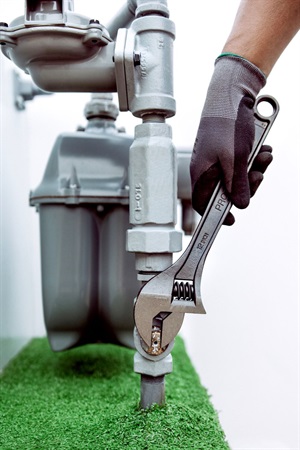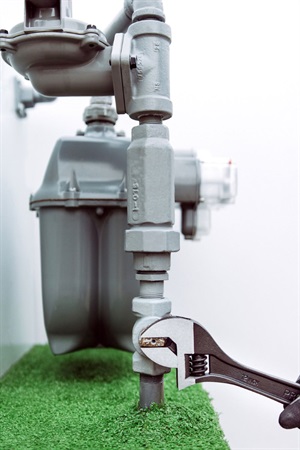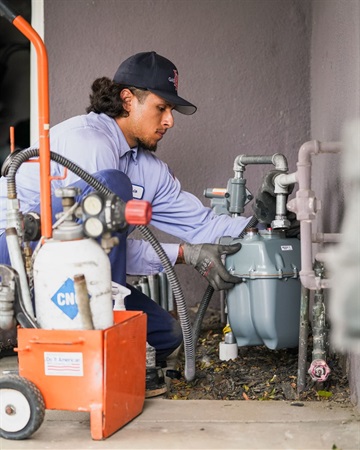Natural Gas Safety
Emergency Gas Shut Off
Knowing the location of your main gas service shutoff valve and how to turn it off will help you stay safe in case of an emergency.
- Know where your gas meter is before an emergency occurs.
- Have a wrench stored in a specific location where it will be available.
- If you smell or hear gas escaping after an earthquake or any emergency, turn off your gas at the meter as shown.
- Use a crescent wrench and give it a quarter turn in either direction so that it runs crosswise on the pipe. The line is now closed.


Meter On Meter Off
Contact Long Beach Utilities at (562) 570-5700 to have your gas service restored.
When To Turn Off Your Gas
Do not turn off your meter unless you smell natural gas or suspect a gas leak. More importantly, only attempt to shut off your gas when it is SAFE to do so. To learn more about gas leaks, visit our page on Natural Gas Leaks.
Appliances Gas Shutoff Valve
Most natural gas appliances have gas shutoff valves and are meant to shut off the gas to that appliance only. In some cases, turning off the gas supply to individual appliances is helpful if the leak is directly coming from a product in your home, or it is being replaced or serviced. You should have a gas shutoff valve installed for each appliance. To cut off the appliance's gas supply, turn the valve a quarter turn. To lean more about taking care of your natural gas appliances, visit our page Appliance Safety and Maintenance.
Natural Gas Leaks
Long Beach Utilities operates and maintains natural gas pipelines in the Cities of Long Beach and Signal Hill. Although it is extremely unlikely for a pipeline incident to occur, we are providing you with the following information to assist you in identifying a possible natural gas leak.
For gas to burn, it must mix with the proper amount of air and be ignited by a flame or spark. Burning natural gas without enough air produces carbon monoxide, a deadly poison. Pure natural gas is colorless and odorless. A chemical odorant is added that gives natural gas a distinctive, sulfur-like odor.
A faint odor of gas may mean that a burner has been left on, or a pilot light is out. A strong odor means you should leave the home at once and call 911 and Long Beach Utilities. Your gas-burning equipment should be inspected regularly by a qualified service person. Check vents, flue pipes, connections, and chimney’s periodically for rust or blockages.
California requires all single-family homes with natural gas-burning appliances, fireplaces, or attached garages to be equipped with approved carbon monoxide detectors.
There are three ways to detect a natural gas leak:
Smell
The presence of an unusual odor similar to rotten eggs.
Sound
An unusual noise coming from the ground, similar to a hissing or roaring sound.
Sight
Dying vegetation around the pipeline and/or a dust cloud over the ground.
For more information, check out our Natural Gas Safety at Home brochure(PDF, 511KB).
Report A Natural Gas Leak
If you suspect a natural gas leak, take others with you and immediately evacuate the area. From a safe location, call the Long Beach Utilities emergency line at 562.570.2140 or call 911.
DO NOT light a match, candle, or cigarette.
DO NOT turn on electrical appliances, lights on/off, or use any device that could cause a spark.
DO NOT use a cell phone near the gas odor.
Proposition 65
The State of California's Proposition 65, the Safe Drinking Water and Toxic Enforcement Act of 1986, intent is to protect California citizens and the State's drinking water sources from substances known to cause cancer, birth defects, or other reproductive harm, and to inform citizens about exposures to such substances.
Long Beach Utilities would like to help you minimize exposure to substances on the State's list. Here are some things to watch for:
Appliances Services
We will inspect and adjust the pilots on your natural gas appliances and equipment, and show you how to use and maintain your appliances correctly and efficiently. If you have questions about the safe operation of your natural gas appliances, please call (562) 570-5700.
Natural Gas Leaks
Natural gas contains small amounts of substances that are on the State's list. If you are near a natural gas leak, exposure to these substances is possible. If you smell a very strong odor of natural gas, leave the area and, from a safe distance, call us immediately at (562) 570-2140 to report the odor and location.
Natural Gas Combustion
Combustion, including burning natural gas, produces substances on the State's list. To minimize the potential for possible exposure, always operate natural gas equipment according to the manufacturer's instructions.
Facilities And Work Sites
Some equipment and materials, such as paint, welding rods, and gasoline, used by Energy Resources Department at its random work sites throughout Long Beach and Signal Hill, contain substances on the State's list. We handle these items cautiously and in accordance with applicable safety standards. Nonetheless, exposure to substances on the State's list, including tobacco smoke, is possible at any of these work sites.
For a complete State of California Proposition 65 list, visit OEHHA at: oehha.ca.gov/proposition-65
Gas Safety(PDF, 511KB)
Natural Gas Appliance Maintenance
Natural gas appliance maintenance is the customer's responsibility, but proper care and maintenance help keep your appliances operating smoothly and efficiently. The following are some helpful tips to keep your appliances operating safely and properly:
- Have your natural gas appliances regularly inspected by a professional at least once a year. This can prevent dangerous exposures to carbon monoxide. See our Carbon Monoxide page for more details.
- Never store rags, paper, or combustibles near any gas appliance.
- Keep the area around the appliances clean. Any possible buildup may result in a fire.
- Follow your local building codes and elevate gas appliances accordingly.
- Replace your furnace filter multiple times each winter or as often as the manufacturer recommends.
- Have your furnace inspected by a professional prior to colder months to avoid any potential issues and ensure your home is properly heated.
- Secure your storage water heater for earthquakes. Kits are available at your local hardware store and we recommend having a qualified professional install it.
- Lower your water heater temperature setting to prevent scalding accidents and lower your energy costs. Refer to your water heater's manufacturing manual for safe temperature settings.
- When using a fireplace, keep the damper open.
- Store gasoline, pant thinner, and aerosol cans safely away from all natural gas appliances.
- If the burners on top of your range have the blue flame, they are working correctly. If the flame looks is yellow, lazy, or leaves soot at the bottom of your pots, a qualified technician must service your range.
Appliance Safety Recalls
Information about product recalls that may affect your appliances is available from the U.S. Consumer Product Safety Commission's (CPSC) website or by phone at 1.800.638.2772.
For Your Home
Keeping your home safe and energy efficient is the best way to lower your energy costs and usage!
Carbon Monoxide Safety
Carbon monoxide (CO) is a colorless, odorless, and poisonous gas. In order to prevent CO poisoning, follow the below safety tips to keep you and your family safe.
Symptoms Of CO Poisoning
Since carbon monoxide is virtually undetectable, you may not realize you are being exposed. Low to moderate CO poisoning can result in symptoms similar to the flu, which include:
- Dizziness
- Headache
- Fatigue
- Nausea
- Shortness of breath
High levels of CO poisoning can result in more symptoms, including:
- Confusion
- Loss of consciousness
- Loss of muscular coordination
- Possible death
What To Do If You Are Experiencing A Possible CO Leak
If you believe you are experiencing a possible carbon monoxide leak, take others and immediately leave the area. Go outside for fresh air and call 911 to report your symptoms. It is also important to immediately contact a doctor for a proper diagnosis and let them know you suspect a CO poisoning. Seek prompt medical attention if you are experiencing any symptoms.
If a CO leak is confirmed, make sure a qualified service technician checks the appliances for proper operation before reuse.
How To Prevent CO Poisoning
- Ensure appliances are installed according to the manufacturer's instructions and building codes.
- Install CO alarms that meet the requirements of the current UL 2034 safety standard. Install them on the entry level of the home as well as near each bedroom.
- Never leave a car running in an attached garage, even with the garage door open.
- Ensure all appliance vents and fireplace dampers are never blocked and have airflow.